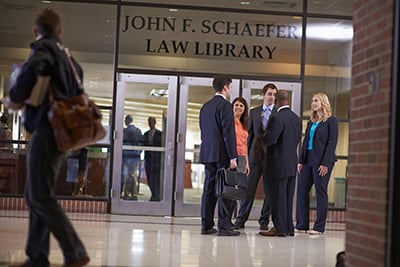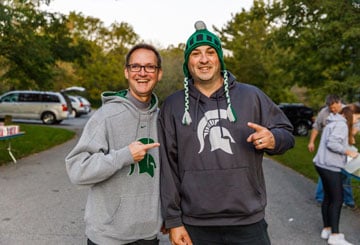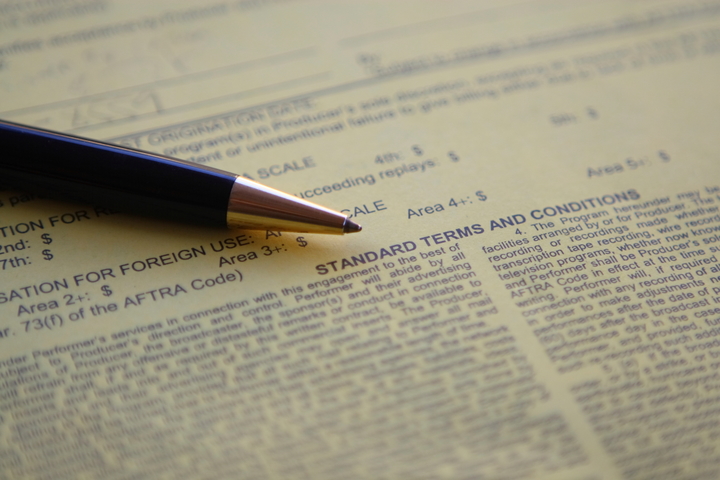Final written examinations are required in most courses at the close of each semester. In addition, other examinations may be required during a course. The student's final grade will be based principally upon his/her achievement as reflected in such examinations.
- Exam Conflicts
(Adopted May 11, 1971. Rewritten June 18, 1996.)- An exam conflict is one in which a student has two exams on the same day, at the same time. When this occurs, the time of one of the exams will be rescheduled, but the day of the exams will remain the same. In addition, the Assistant Dean for Student and Academic Affairs may for compelling reasons reschedule an exam to occur within 24 hours of the originally scheduled time. Compelling reasons include, but are not limited to: 1. The exam schedule changes after the student has registered, or 2. A student has three consecutive exams (for example, one evening exam and two exams immediately following on the next, or three exams in any one day). There must be compelling reasons to reschedule an exam that does not conflict with another exam and the request must be submitted to and approved by the Assistant Dean for Student and Academic Affairs.
- Students enrolled in courses with simultaneous exam times are required to take up to two examinations on the same day and must be sequestered from their fellow students until the start of their second examination.
Please report any exam conflicts to the Assistant Dean for Student and Academic Affairs at least two (2) weeks prior to the start of the examination period by submitting a "Statement of Exam Conflict."
Every effort is made to accommodate students in their choice of exam times. However, the Law College reserves the right to mandate an exam schedule when it is in the best interests of the student body. - Once an exam conflict accommodation form is received and approved, it is the student's responsibility to report to the Registrar's Office the day of the exam conflict immediately after their first exam has ended. The student will remain sequestered for the interim period of exams on the day in conflict. If the day in conflict runs through lunchtime, it will be the student's responsibility to bring a brown bag lunch, as you will remain sequestered during this time.
- ExamSoft
- ExamSoft is the software used by MSU Law and Guest students to take in-class finals that require laptops. There are specific instructions regarding the use of ExamSoft for an in-class examination versus a take-home examination. Please visit the MSU Law Registrar's Office website for the most current instruction manuals.
- Examsoft accounts are updated yearly. Students are notified when their new account is created and must log in to Examplify with the new account in order to access their exams.
- Students are strongly encouraged to perform a practice final examination using ExamSoft to become familiar with the program and the steps required.
- Exam and Paper Retention Policy
(Adopted: April 18, 2018)- The College Complies with the ABA Council Statement that "[l]aw schools approved by the American Bar Association should practice the policy of retaining examination booklets for a period of one year. This policy applies only if the examination booklet has not been returned to the student." We interpret "examination booklets" to include other graded written assignments such as papers and journal notes.
- Identification
- All MSU Law and Guest students must present their MSU Law student I.D. card in order to sit for each final exam. Identification cards may be obtained at the MSU ID Office, Room 170 in the MSU International Center, prior to exams.
- Make-Up Examinations and Grade of Incomplete
(Adopted: April 19, 1995. Amended: November 2021.)- If a student is unable to take a mid-term or final exam, or turn in a final course paper, such that a grade of "W" will otherwise be the outcome, for reasons beyond his/her control, then the student may petition to the Associate Dean for Academic Affairs for an opportunity to take a "make up mid-term exam", make-up final exam or receive the grade of "I", or to extend the deadline for the final course paper. Such a petition must be promptly made after the events in question have occurred. The granting or denial of any petition under this policy is within the discretion of the Associate Dean for Academic Affairs, whose determination is final.
- Make-Up Examinations
- Mid-Term Exam
- After the Associate Dean for Academic Affairs determines that there are reasons beyond the student’s control that prevented the student from taking a mid-term exam, it is within the discretion of the faculty member teaching the course to permit a student to take a make-up mid-term exam, the conditions upon which the make-up exam is to be taken and graded, and the deadline to take the exam.
- Given the time constraints associated with mid-term exams, if a faculty member does not permit a student to take a make-up mid-term exam, the student’s grade in the course will be solely based on the grade earned on the final exam and other assignments for the course.
- Final Exam
- After the Associate Dean for Academic Affairs has granted the student approval to take a make-up final exam, the faculty member teaching the course in which the examination was missed may administer the same exam as that administered to the student’s class or a different exam. If the faculty member elects to utilize the same exam as that given to the class, the student electing to take the make-up exam must execute an affidavit affirming that they have not discussed the contents of the exam with anyone.
- Any make-up final exam must be taken within 30 days of the original exam. Make- up final exams taken within 72 hours will be curved with the rest of the class and given an alpha grade. Make-up final exams taken after the 72-hour period will be evaluated on a pass-fail basis. No letter grade will be awarded. The exercise of this pass/fail option will not count towards the maximum credit/no credit election otherwise available to students.
- To allow for the implementation of the make-up exam process, ALL examinations MUST be turned in to the proctor at the time of their taking. Thereafter, neither the registrar nor a faculty member will make exams available to any student until after the make-up final exam has been taken.
- Mid-Term Exam
- Extension of Time to Complete Final Course Paper:If the events in question precluded the submission of a final course paper in a timely manner, the Associate Dean for Academic Affairs may, in his/her discretion, extend the deadline for submission thereof by no more than 30 days.
- Incomplete for Final ExaminationsAn incomplete shall be permitted for a missed final examination pursuant to the following:
- A student electing to receive an incomplete must complete the course and earn credit by taking the next regularly scheduled examination in the same course, regardless of the faculty member teaching the course.
- A student who receives an incomplete is not required to attend classes, but is encouraged to do so.
- Once the examination has been taken, the grade of "I" is replaced with the letter grade earned.
- No additional tuition will be charged to a student who completes a course while holding the grade of "I".
- A failure to complete the course by taking the exam at the appropriate time will result in the grade being changed to a "W". See infra, Withdrawal Policy.
- Make-Up Examinations
- If a student is unable to take a mid-term or final exam, or turn in a final course paper, such that a grade of "W" will otherwise be the outcome, for reasons beyond his/her control, then the student may petition to the Associate Dean for Academic Affairs for an opportunity to take a "make up mid-term exam", make-up final exam or receive the grade of "I", or to extend the deadline for the final course paper. Such a petition must be promptly made after the events in question have occurred. The granting or denial of any petition under this policy is within the discretion of the Associate Dean for Academic Affairs, whose determination is final.
- Non-Laptop Exam Preference
- Students who wish to take their final examination using a bluebook when laptops are permitted may do so. Non-laptop students are encouraged to bring earplugs if there is any concern regarding distractions. Earplugs also can be obtained from exam room proctors.
- Paper, Directed Study, or Project Courses
(Adopted: April 19, 1995. Amended November 12, 1997; April 17, 2002.)- Some courses, particularly seminars, often require a paper or project in lieu of an examination, or in addition to the examination. In courses where a paper or project is required, the due date shall be the date specified by the faculty member teaching the course or, if no date is specified, the last day of the examination period.
- For good cause, a due date later than the date set for faculty submission of grades may be permitted, but only with the concurrence of the faculty member and the Associate Dean for Academic Affairs. The failure to turn in a written work on or before the due date constitutes a withdrawal from the course unless the student has been granted a grade of "I" (incomplete).
- If the events beyond the student's control preclude the submission of a final course paper in a timely manner, the Associate Dean may extend the deadline for submission thereof by no more than thirty (30) days.
- Religious Observance
- If an examination falls on a religious holiday the student is required to observe, the student must notify the Assistant Dean for Student and Academic Affairs to arrange for a make-up date and time.
- Examination Policies
(Amended: November 17, 2015.)- Examination Security PolicyThe following devices or items are not permitted in the exam testing area, which includes restrooms and exam floor hallways:
- Hats, hoods or other headgear (except items of religious apparel)
- Electronic devices such as cell phones, calculators, pagers, cameras, radios, recording devices, hand-held computers, any type of personal digital assistant, wireless email devices, etc.
- All cell phones must be turned OFF and stored away from the testing area.
- IPods or similar devices
- Headphones
- Earplugs connected to electronic or non-electronic devices. (Complimentary earplugs are available from proctors.)
- Any type of wireless communication device
- Watches or timepieces of any kind
- Any other item not specifically allowed
- Possession of prohibited devices or items during the examination or in the restrooms and exam floor hallways will be deemed an exam irregularity pursuant to the MSU Law Code of Student Discipline.
Any faculty, staff (including examination proctors), or student of the Law College has standing to assert a violation of the Code. - Examination Conduct PolicyAnonymity, equality, and security are seen as imperatives in the examination process. Policies and procedures have been established to promote these goals and provide for the best possible conditions under which all students can take examinations. All exams are administered by proctors under the supervision of the Registrar. Students are expected to respond appropriately to proctors’ requests and to guard against even the perception or appearance of inappropriate exam behavior.
- Any examination irregularity, or any act of plagiarism in the submission of a written assignment is subject to discipline under the Code of Student Discipline. Such a finding may be based upon any probative evidence of, but not limited to, the following:
- Any conversation with another student during an examination, irrespective of the subject matter of that conversation
- During an examination, the possession in the exam testing area of any prohibited material, irrespective of its use
- During an examination, any perusal of another student’s examination answer, irrespective of the use of such perusal
- Disseminating any examination materials or information to another person who has not yet taken the examination
- Use of another person’s writings without proper attribution
- Students must enter/exit the fourth floor examination rooms using the side doors of the classroom.
- Students must sign in while presenting their school picture ID. Lost IDs must be replaced at the MSU ID Office, Room 170 in the MSU International Center, prior to exams.
- Students may not leave the exam room after signing in until after the exam begins. Students should be sure they have all examination materials they are allowed to bring (example: outlines, laptop) prior to entering the exam room.
- Late arrivals may enter and sit for the exam, but no extra time will be given.
- Students must be seated every other seat unless directed otherwise.
- No materials other than pens and those provided by the proctors are permitted unless specified by the professor. All materials not permitted must be placed on the outer perimeter of the room. All materials on the desks are subject to inspection upon request. Purses are to be placed on the floor.
- Once the exam password is shared, no communication between students is permitted.
- When paper copies of exams are distributed, students may not read any portion of the exam until told to do.
- Students should NOT place their student number (PID) or name on exam materials, only exam permit number if directed to do so by the exam proctor.
- Exams may not be unstapled, torn, or taken apart in any manner. No pages may be torn out of exams or blue books and no questions may be copied in any manner. If something is torn or comes apart, notify the proctor. No exams or portions thereof may be kept at any time.
- If using scantrons as part of an exam, students are instructed to turn them over when completed so as to protect anonymity and answers.
- Students should be quiet in the hallway when taking a restroom break during the exam.
- Students are prohibited from reviewing outlines/notes or sending/receiving electronic communications during the restroom break. Cell phone use by an examinee in the hallways or restrooms on the 3rd or 4th floors is prohibited while exams are taking place.
- When the exam timer reaches zero, Examplify will automatically close and upload the exam as is. When told to stop because the examination time has ended, students must stop writing immediately.
- Exams and materials are turned in individually to the proctors. Materials must be checked and students may not leave until the proctors have checked them out. If there is a line for check out, no communication is permitted until all students have checked out.
- If a student completes the exam before others he or she may leave the examination room unless directed otherwise. Students are to be quiet when leaving the examination room and exam floor.
- Any questions or concerns with regard to exam policy and administration should be directed to the Registrar's Office or the Office of Student Affairs.
- Any examination irregularity, or any act of plagiarism in the submission of a written assignment is subject to discipline under the Code of Student Discipline. Such a finding may be based upon any probative evidence of, but not limited to, the following:
- Emergency Evacuation PolicyIn the event you must vacate the examination testing area while an exam is still in progress, for reasons such as a fire alarm, the Examination Security and Conduct Policies noted above continue to apply.
- Examination Security PolicyThe following devices or items are not permitted in the exam testing area, which includes restrooms and exam floor hallways:
- Testing Accommodations under the ADA
(Updated: May 9, 2022.)- The Resource Center for Persons with Disabilities (RCPD) assists students, faculty, and staff by maximizing ability and opportunity for full participation at MSU. If you are a student or employee at MSU, and you have a disability that substantially limits a major life activity, you can register with the RCPD and you may be eligible to receive accommodations. Please note this information is kept strictly confidential. Self-identification is voluntary. However, if you have a disability, not registering with the RCPD may delay or compromise the availability of accommodations. As many reasonable accommodations require significant pre-planning, registration with the RCPD prior to situations requiring accommodations is essential.
- Testing Accommodations for ESL Students
(Updated: May, 2022.)- Non-JD students for whom English is a Second Language (ESL) may receive exam accommodations under some circumstances.ESL accommodation requests must be initiated by the end of the 4th week of classes. The Assistant Dean for Student and Academic Affairs in their discretion may grant the following accommodations under the following circumstances:
- Accommodations are limited to additional time, up to 20 minutes per hour, on written examinations and/or the use of a translation (non-legal) dictionary.
- No accommodations are available for take-home exams, papers, or oral presentations.
- Students must not have attended a college or university for two or more years wherein instruction was primarily or exclusively English.
- Accommodations are available only for the 24-month period following a student's first day of class.
- Non-JD students for whom English is a Second Language (ESL) may receive exam accommodations under some circumstances.ESL accommodation requests must be initiated by the end of the 4th week of classes. The Assistant Dean for Student and Academic Affairs in their discretion may grant the following accommodations under the following circumstances:
- Withdrawal
(Adopted: April 10, 1996-Supersedes Policy Adopted December 1, 1981. Amended August 19, 1998; April 17, 2002.)- "W" signifies that the student has withdrawn from the course. A student may withdraw, without permission, at any time prior to entering the examination room. Once the student enters the examination room, he/she is committed to receiving a grade.
- Withdrawal from any course during a semester may affect eligibility for scholarships, Law Review and financial aid.
- Excessive withdrawal from courses may result in the inability to complete the J.D. or graduate program degree curriculum within the required number of years.
A first-year J.D. student may not withdraw from any first-year course unless the student withdraws from all courses in that semester.- NOTE: Employers notice withdrawals on transcripts. Seeing multiple withdrawals ("W") on a student's transcript may dissuade an employer from making an offer of employment to a student. Why? Because it indicates an inability on the student's part to meet deadlines and lack of commitment in completing tasks.
Updated August 15, 2022



